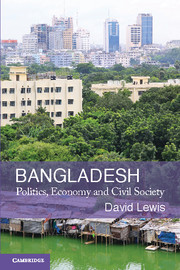Book contents
- Frontmatter
- Contents
- Maps
- Abbreviations
- Acknowledgements
- 1 Introduction
- 2 A State in the Making
- 3 Towards Bangladesh
- 4 State, Politics and Institutions
- 5 Nongovernmental Actors and Civil Society
- 6 Economic Development and Transformation
- 7 Population, Natural Resources and Environment
- 8 Conclusion
- Glossary of Bengali Terms
- Bibliography
- Index
3 - Towards Bangladesh
British and Pakistani Rule
Published online by Cambridge University Press: 05 June 2012
- Frontmatter
- Contents
- Maps
- Abbreviations
- Acknowledgements
- 1 Introduction
- 2 A State in the Making
- 3 Towards Bangladesh
- 4 State, Politics and Institutions
- 5 Nongovernmental Actors and Civil Society
- 6 Economic Development and Transformation
- 7 Population, Natural Resources and Environment
- 8 Conclusion
- Glossary of Bengali Terms
- Bibliography
- Index
Summary
Bangladesh's existence as a nation-state only dates from 1971, but the nation cannot be understood without reference to a much-longer historical backdrop. In this chapter we provide a selective historical overview leading up to the moment when Bangladesh emerged as a separate country, aiming to contextualise analysis of state and economy against the longer-term developments in the region. The chapter begins with a brief discussion of precolonial Bengal, a period with important implications for the shaping of the natural environment and of social and religious identities. It then moves to the period of British rule, first describing the role of the East India Company in securing the region as part of the British Empire, and then its gradual incorporation into the formal administrative structures of colonial rule, which brought lasting political and economic consequences, for example, in state formation. The weakness of the Bangladesh state today has important historical roots in the influence of more than three hundred years of economic globalisation during which the country moved from a position of relative economic strength and vitality to a position of structural weakness within the global economy (McGuire 2009).
The third section considers partition in 1947 and the period that followed when Bangladesh existed for more than two decades as East Pakistan. This was a time when the country experienced the disruption of internal economic colonisation, which led to growing resistance and Pakistan's civil war in 1971. Finally, the chapter summarises the years of Bangladesh's independence. Bangladesh's founder and first prime minister, Sheikh Mujibur Rahman, experimented with secular nationalist identities (1971–5) and built close ties with neighbouring India and the Soviet Union. The mili-tary regimes of General Ziaur Rahman (1975–81) and General H. M. Ershad (1982–90) gradually moved Bangladesh towards closer links with the United States and other Muslim countries, particularly the Arab states, contributing to the strengthening of a Muslim Bengali cultural identity.
- Type
- Chapter
- Information
- BangladeshPolitics, Economy and Civil Society, pp. 41 - 74Publisher: Cambridge University PressPrint publication year: 2011

